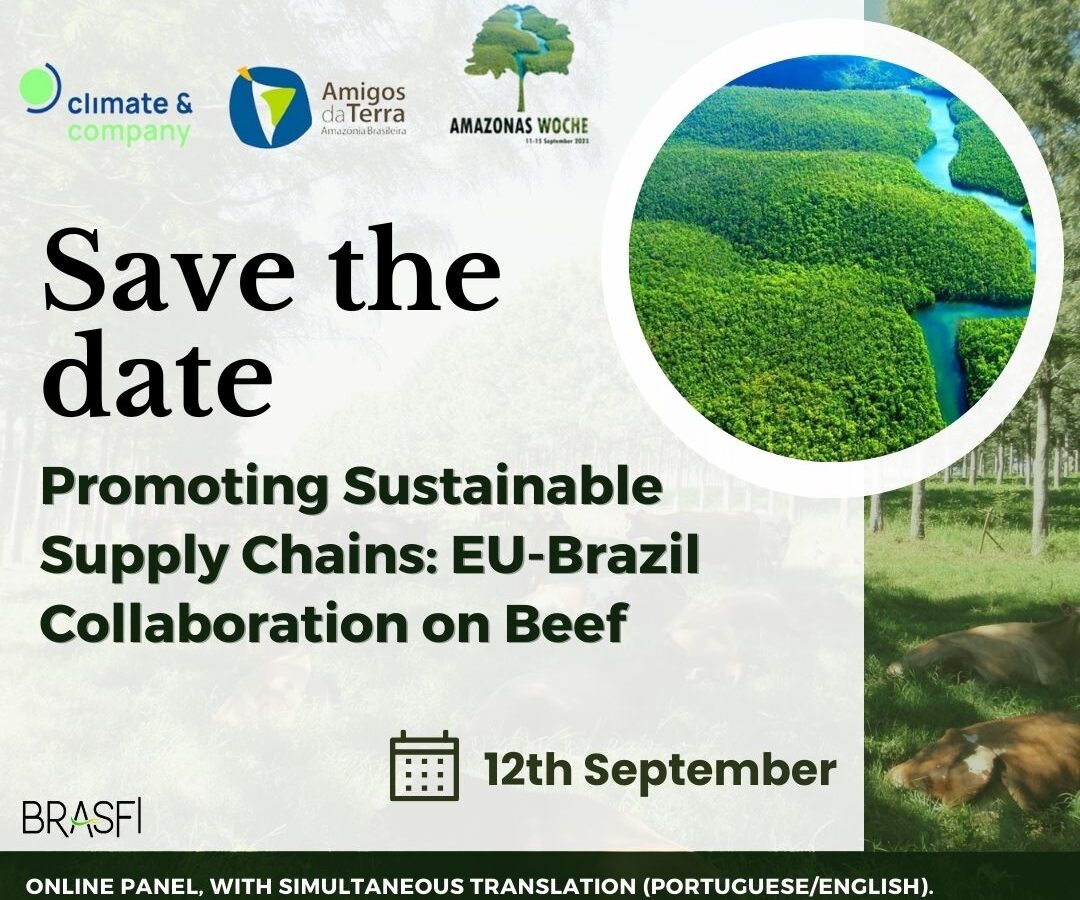
Webinar Recap: Promoting Sustainable Supply Chains: EU-Brazil Collaboration on Beef
September 25, 2023
How can we promote sustainable beef supply chains? This was the leading questions of this webinar we hosted in collaboration with the NGO Amigos da Terra – Amazônia Brasileira and the support of BRASFI – the Brazilian Alliance for Sustainable Finance and Investments during the “Amazonas Woche” organised by the Embassy of Brazil in Berlin. Here you can find a recap of the event
As part of this Amazonas Woche, Climate & Company, in collaboration with the NGO Amigos da Terra – Amazônia Brasileira and the support of BRASFI – the Brazilian Alliance for Sustainable Finance and Investments, hosted two webinars which were organised as part of a project financed by the Betty and Gordon Moore Foundation. By engaging experts from both Brazil and Germany, these webinars facilitated meaningful bilateral discussions and exchange of ideas related to (1) the promotion of a sustainable beef supply chain and (2) the key role played by the media and the civil society organizations in shaping public perception of deforestation (find here our recap).
These are our 6 key takeaways on “Promoting Sustainable Supply Chains: EU-Brazil Collaboration on Beef”:
- Brazil advances in beef supply chain traceability but should expand individual traceability, especially in the initial stages, which is necessary to comply with the EUDR;
- There is a need to expand the implementation of traceability systems generating effective value for the inclusion of small and medium cattle ranchers;
- There is a need to define strategies to assist informal farmers in adapting to regulatory frameworks across the beef supply chain;
- FEBRABAN is monitoring the implementation of its most recent regulation which defines a minimum protocol for banks when offering credit to meatpackers and slaughterhouses in the Legal Amazon aiming to prevent illegal deforestation;
- Trade relationships between Brazil and the EU continue to be important for the sector. Fostering communication among stakeholders in the beef supply chain and between the EU and Brazil is crucial for building a trusting relationship;
- International cooperation is crucial to support compliance with EU regulations.
This webinar was held on 12th September and aimed to foster dialogue and collaboration between stakeholders in the EU and Brazil involved in the cattle industry to enhance the sustainability of beef supply chains. The following speakers were present to give their views:
- Fernando Sampaio – Director of Sustainability at ABIEC (Brazilian Beef Exporters Association)
- Vasco V Picchi – New Business Director at Safe Trace S/A
- Amaury Oliva – Director of Sustainability at FEBRABAN (Brazilian Federation of Banks)
- Stephan Schäfer – Attorney at ZENK Rechtsanwälte
- Louise Simon – Analyst at Climate & Company
The panel was moderated by Mauro Armelin, executive director of the NGO Amigos da Terra – Amazonia Brasileira.
The 5th of September is dedicated to celebrating the largest tropical forest on the planet, the Amazon Rainforest. To promote the discussion on the sustainable development of the Amazon region and to foster the dialogue between stakeholders in Brazil and Germany, the Embassy of Brazil in Berlin organised a series of events. The “Amazonas Woche” took place from the 11th to the 15th. See the programme here.
Fernando Sampaio started highlighting the commitment of the members of ABIEC in complying with the regulatory framework on free deforestation in Brazil and the EU, whose agenda includes a priority focus on traceability. He pointed out that in the Brazilian system, cattle can transition through multiple farms during their early years, posing a challenge in tracing the beef supply chain from birth to the slaughterhouse. He mentioned that Brazil has a mandatory traceability system for sanitary control, called the “Animal Transportation Permit” (GTA, in Portuguese), which could be used for monitoring and tracking cattle production in the country. However, data is not public, and adjustments need to be made to the legislation. During his intervention, Fernando emphasised the need to define sustainable production criteria and the data that should be measured and monitored. Another urgent demand is to develop strategies to support farmers who operate informally to comply with the regulatory framework.
Then, Amaury Oliva talked about the role played by financial institutions in this agenda, mentioning FEBRABAN’s efforts in establishing a dialogue with various stakeholders to create a minimum protocol for banks to avoid deforestation in Brazil. FEBRABAN’s regulation (add link), published in May 2023, provides that banks when offering credit to meatpackers and slaughterhouses in the Legal Amazon, must comply with minimum requirements to prevent illegal deforestation. To comply with this regulation, banks should request their customers to implement traceability and monitoring programs by 2025. This regulation does not define what each bank must do but defines the need for an adaptation plan. The message is clear: anyone who does not want to adapt will have credit restrictions. This is already established in other regulations issued by the Brazilian Central Bank (BCB) that prohibit granting credit to producers who do not meet minimum rules. With this regulation, FEBRABAN goes beyond the BCB.
The third speaker, Vasco Picchi, emphasised that Brazil possesses traceability technologies to meet different protocols, including the EUDR, not only in the Amazon region but across the country. In his opinion, the main challenge is to expand traceability and generate effective value for the inclusion of small and medium cattle ranchers. The implementation of traceability systems requires user training that must be considered. He divided the traceability technologies available into three groups: animal identification, internal traceability, and external traceability, where the latter integrates the possibility of accessing data from the Animal Transportation Permit. Vasco mentioned the traceability initiative “Green Seal” in Brazil as an excellent example of what has been developed in Brazil on this matter.
After that, Dr. Stephen Schäfer highlighted the EU regulatory framework in place and the challenges that SMEs have faced to comply with it, at least in Germany, where it represents 80% of food companies. In his opinion, . Compliance with EU regulations results in higher prices for producers and, consequently for customers. Therefore, paying for sustainability requires a consumer education process in Europe. He suggested the creation or enhancement of initiatives, such as roundtables, between Brazil and the EU to facilitate communication and build a relationship of trust. Dr Schäfer also mentioned the EUDR Article 30, which mentions the commitment of the EU in establishing cooperation with countries affected by the regulation.
Our colleague Louise attended an event in Brazil a few weeks ago, where she participated as a panelist to talk about the EU regulatory framework. During the panel, she shared her positive view on the discussion held during this event in Brazil and underlined the importance of fostering communication between Brazil and the EU to showcase the initiatives and progress made in Brazil and explore potential areas of cooperation.
More information and our webinar on The Role of Media Coverage in shaping Public Perceptions of Deforestation-free Initiatives in Brazil and Germany
The webinar was recorded and is available on the YouTube channels of Amigos da Terra – Amazonia Brasileira (link) and BRASFI (link). You can also find it embedded below. We encourage you to watch it!
If you have any questions or suggestions regarding these topics, feel free to reach out to us! We would love to get in touch.
Our team also organised a second webinar on the role of media in shaping public perceptions of deforestation. You can find the event recap here. Both events were organised as part of a project financed by the Betty and Gordon Moore Foundation. You can find more information on the event in the event resources below. By engaging experts from both Brazil and Germany, these webinars facilitated meaningful bilateral discussions and exchange of ideas related to the promotion of a sustainable beef supply chain (panel 1) and the key role played by the media in shaping public perception of deforestation (panel 2).
